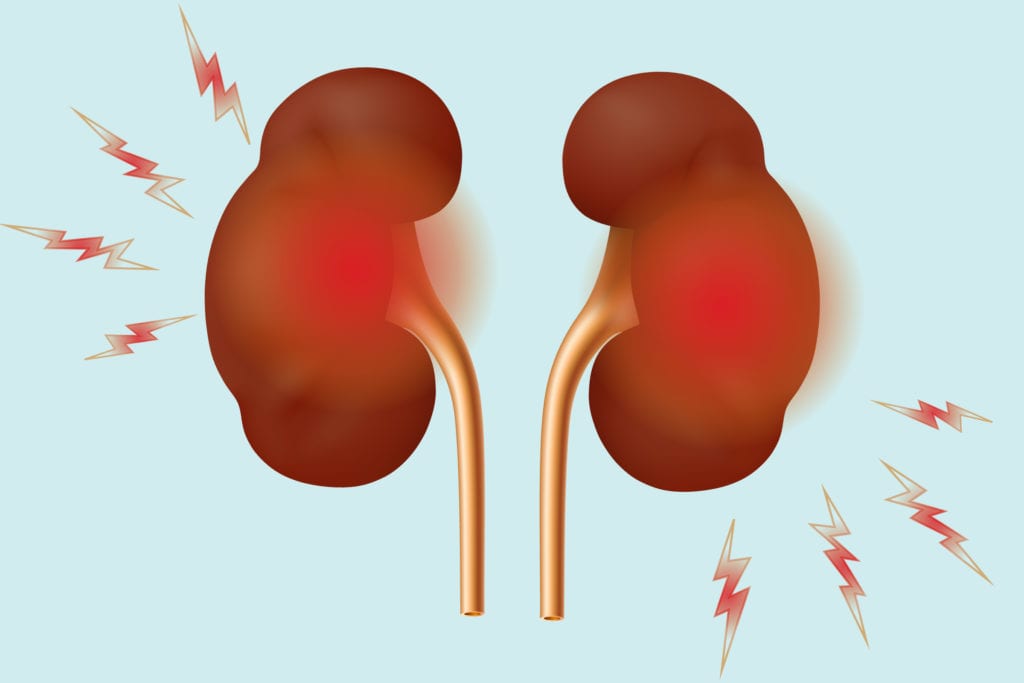

Your two kidneys are each the about the size of a fist, the shape of a bean, and packed with a million or so tiny filtering units called nephrons. Their main job: to remove waste and extra water out of your blood to make urine. They also help balance your body’s salts and minerals and produce hormones that regulate blood pressure, make red blood cells, and help keep your bones strong.
So, what does a joint condition like arthritis have to do with these hard-working organs? More than you may think.
People with rheumatoid arthritis (RA) are at a significantly higher risk of developing chronic kidney disease, according to data from a meta-analysis presented at the American College of Rheumatology’s annual meeting in 2018. In one study, researchers found that over a 20-year period, people with RA have a one in four chance of developing chronic kidney disease, compared with a one in five risk among people who don’t have rheumatoid arthritis.
How RA Affects the Kidneys
The same chronic, systemic inflammation that targets your joints in arthritis can also affect other parts of your body — such as your heart, lungs, and kidneys. Uncontrolled inflammation may damage cells that line blood vessels and contribute to atherosclerosis, a disease where plaque can build up inside renal arteries (the arteries in your kidneys), explains Brad H. Rovin, MD, director of the division of nephrology and Vice Chairman of Medicine for Research at the Ohio State University Wexner Medical Center in Columbus. Over time, the plaque hardens and narrows the arteries, limiting the flow of oxygen-rich blood to your kidneys, which may lead to kidney disease.
Another potential kidney problem for people with long-standing, poorly controlled rheumatoid arthritis: amyloidosis.
This disease occurs when an abnormal protein — called an amyloid — builds up in your kidneys. “Amyloidosis can develop in patients with chronic inflammatory conditions like RA or chronic infections,” says Dr. Rovin.
Research also shows RA patients have a higher risk of developing glomerulonephritis — an inflammation of the kidney’s filtering units (called glomeruli), which can impair kidney function and lead to chronic kidney disease.
Heart problems play a role as well. “RA patients have more hypertension and other cardiovascular risk factors, which can also be risk factors for chronic kidney disease,” said Dr. Rovin. A study published in the American Journal of Kidney Diseases found obesity, high blood pressure, and high cholesterol can contribute to a higher kidney disease risk for RA patients.
How Arthritis Medications Can Impact Kidneys
“Generally, medications used to treat inflammatory conditions like RA have little effect on your kidneys when taken as prescribed,” says Justin Owensby, PharmD, PhD, research pharmacist with the department of clinical immunology and rheumatology at the University of Alabama at Birmingham.
However, if your kidney function is already reduced, your doctor may need to adjust the dosage of a certain medication, or stop it completely. “The role of our kidneys is to help remove waste products from the bloodstream. Kidneys perform this same role with many RA medications,” explains Jared J. Vanderbleek, PharmD, pharmacist at the Kirklin Clinic at the University of Alabama at Birmingham. “If the kidneys are not working properly, more medication stays in your bloodstream longer, which increases the chance of unwanted side effects.”
Potential negative effects on kidney function may occur with specific RA meds, such as:
NSAIDs: Nonsteroidal anti-inflammatory drugs (NSAIDs) — such as ibuprofen and naproxen — may worsen kidney function by affecting blood flow within the kidneys, explains Dr. Vanderbleek. Any patient with chronic kidney disease should avoid long-term use of NSAIDs, says Dr. Rovin. “Even patients with good kidney function can develop an allergic response to NSAIDs that can be centered in the kidney and cause inflammation,” he adds.
DMARDs: Disease-modifying drugs such as methotrexate and sulfasalazine may damage the kidneys at very high doses (much higher than the doses recommended to treat RA), says Dr. Owensby. When toxicity is detected early, kidney function recovers after the drug is stopped.
Steroids: While corticosteroids, such as prednisone, don’t have a direct effect on the kidneys, over time, they may cause the body to retain fluid and lead to an increase in blood pressure, says Dr. Owensby. High blood pressure can raise your risk of chronic kidney disease.
Biologics: Changes in kidney function were reported with an anti-TNF drug, tofacitinib (Xeljanz), says Dr. Vanderbleek, “but the changes were not deemed clinically significant and kidney returned to normal after drug discontinuation.” Some good news, adds Dr. Rovin: an article published in the journal Kidney International suggests patients with RA who are treated with biologics had a lower incidence of chronic kidney disease and progressive decline in kidney function than RA patients not treated with biologics.
Warning Signs of Kidney Disease
At first, there may be none. That’s because the kidneys are adaptable organs and can compensate for damage or loss of function. In fact, most people with kidney disease have no symptoms in the early stages. Once the disease has progressed, however, some signs may include:
- Nausea or vomiting
- Loss of appetite
- Feeling tired or weak
- Swelling in your legs, feet, or ankles
- Changes in how much you urinate
- Trouble concentrating
- Muscle twitches and cramps
- Persistent itching
- Chest pain (if fluid builds up around the lining of the heart)
- Shortness of breath (if fluid builds up in the lungs)
- High blood pressure (hypertension) that’s difficult to control
How to Keep Your Kidneys Healthy
Protecting your kidneys is important: Kidney disease can get worse over time and may lead to kidney failure, says Dr. Rovin. If your kidneys fail, you will need dialysis or a kidney transplant to maintain your health. People with kidney disease are also at higher risk for heart disease. To help keep your kidneys healthy:
1. Keep your RA disease activity under control
“A lot of the toxicity of RA can be related to inflammation in poorly controlled disease,” says Dr. Rovin. “Therefore, good adherence to medical therapy is key.” (You can use our ArthritisPower app to track your symptoms and disease activity and share your results with your doctor.)
2. Get your kidney function tested regularly
Your doctor may order a blood test to look for the level of waste products, or take a urine sample, which may show abnormalities that point to chronic kidney disease.
3. Review your meds with your doctor
If your kidney function is already reduced, your doctor will consider the severity of the impairment and the drug in question to determine the next step, says Dr. Owensby. NSAIDs may be reduced or removed from your regimen, for example, if your kidney function is poor.
4. Manage your blood pressure
Over time, uncontrolled high blood pressure can damage blood vessels in the kidneys, reducing their ability to remove waste and extra fluid from your body. Extra fluid in the blood vessels may then raise blood pressure even more, creating a dangerous cycle. Get your pressure checked regularly, advises Dr. Rovin; “it should be maintained in the 120/80 range, with medications to lower blood pressure if needed.”
5. Eat less salt
When your kidneys are not healthy, extra sodium and fluid builds up in your body, which can cause swelling or puffiness, a rise in blood pressure, shortness of breath, or fluid around your heart and lungs. To reduce your salt intake, skip products with lots of added salt, such as frozen dinners, canned soups, and fast foods. And limit salty snack foods, canned veggies, and processed meats.
6. Drink more water
It helps remove waste from your blood in the form of urine and helps keep blood vessels open so blood can flow to your kidneys. If you become dehydrated, the system doesn’t work as well. Some research also suggests drinking more fluids may also help protect against chronic kidney disease. Aim for six to eight, eight-ounce glasses a day.
Keep Reading
Subscribe to CreakyJoints
Receive our newsletter and stay informed about arthritis treatments, comorbidities, and more.





